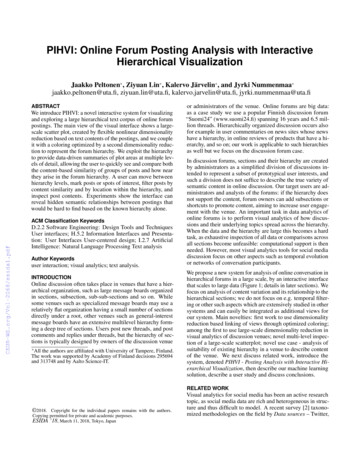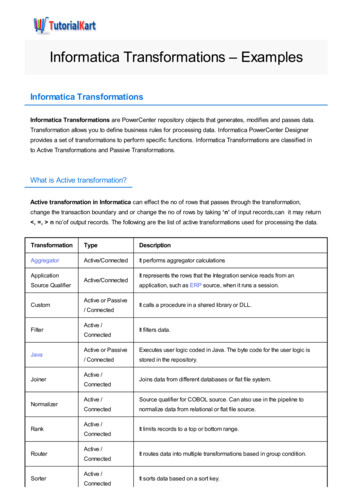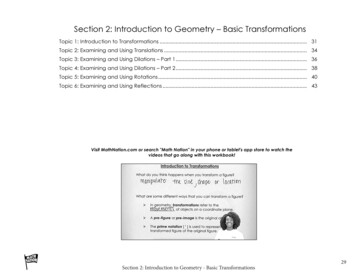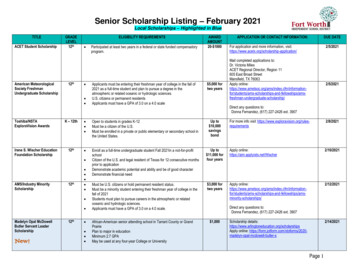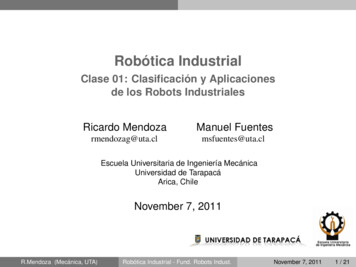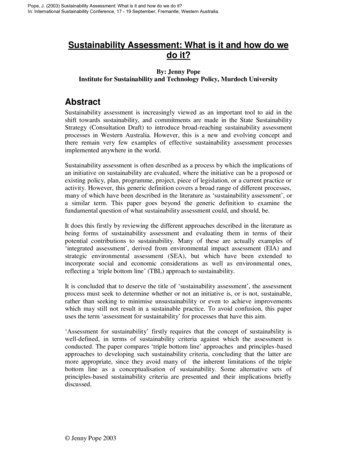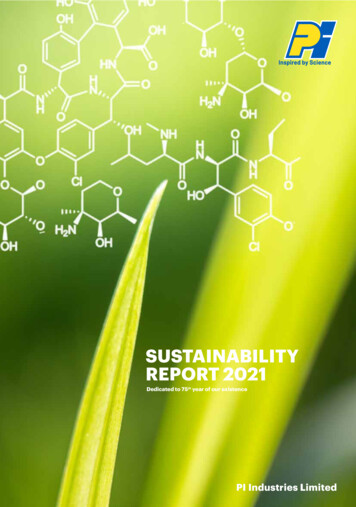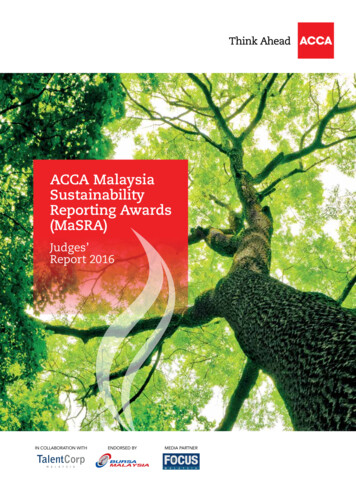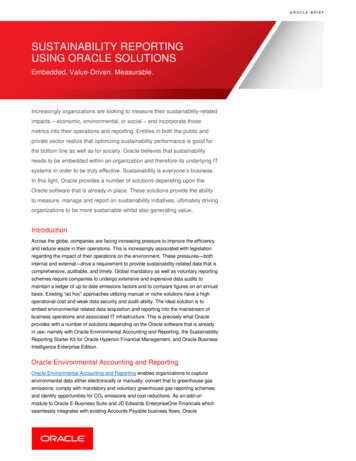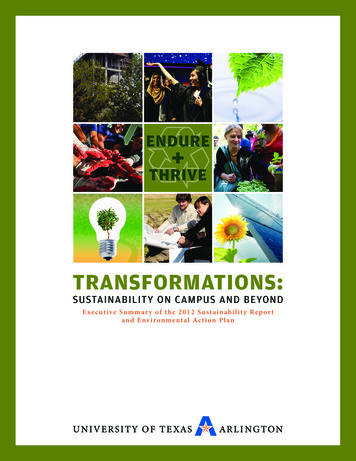
Transcription
TRANSFORMATIONS:SUSTAINABILITY ON CAMPUS AND BEYONDE x e c u t i v e Su m m a r y of t h e 2 0 1 2 Su s t a i n a bi l i t y R e p or ta n d E nv i ron m e nt a l Ac t i on P l a n
SUSTAINABILITY AT UT ARLINGTONINTEGRATING SUSTAINABILITYAt the University of Texas at Arlington (UT Arlington),The success of sustainability initiatives requires engagement,participation, and collaboration at all levels of the university,across campus, and beyond. To foster a university-wide andintegrated approach to sustainability, former University PresidentJames D. Spaniolo launched the President’s SustainabilityCommittee in 2007 (later renamed the University SustainabilityCommittee), followed by the creation the Office of Sustainabilityin 2010 and the execution of the University’s Sustainability Policyin 2011.we view sustainability as a path of continuousimprovement where our actions protect and enhancethe human and natural resources needed for futuregenerations to enjoy a quality of life equal to or greaterthan our own.UT Arlington is committed to sustainable development and tocreating a healthy, ecologically appropriate, economically viable,and socially responsible living and learning environment forall students, faculty, and staff. We recognize that responsibleoperations and management of shared resources can also enrichquality of life, in both direct and indirect ways.Office of SustainabilityThe Office of Sustainability aims to provide the framework forenvironmental stewardship, natural resource conservation,emissions reductions, and sustainability. To facilitate a cultureof sustainability on campus, regionally and nationally, the officeprovides innovative initiatives, programs, campaigns, educationalservices, group activities, and outreach opportunities. The officecoordinates and collaborates with other offices and departmentsand the University Sustainability Committee. Examples ofcampus sustainability programs include the car sharing program,campus-wide recycling, and the Community Garden at UTArlington, which is highlighted on page 5.This summary of Transformations: Sustainability on Campusand Beyond, our 2012 sustainability report and environmentalaction plan, highlights the progress we are making throughthe individual and joint efforts of administration, faculty, staff,and students—and through partnerships with communities,businesses, government, and other higher education sectors.The full report, which is available for download at our website,discusses sustainability within four key areas: education andresearch, environment, social, and economic. This summaryfocuses more on the environment section with brief overviews ofthe other sections.2007 University Sustainability Committee forms.A TIMELINE OF SUSTAINABILITY AT UTA19941974 Energy conservationefforts begin on campus.1970 Campus-wide recycling program receivespresidential approval.1995 President’s RecyclingAdvisory Committee forms.1990 Association for the Advancement of Sustainability in HigherEducation membership begins. Composting program receives awards from the State of TexasAlliance for Recycling, the Greater DFW Recycling Alliance and theNorth Texas Corporate Recycling Alliance. Trailblazer in “closing the gap” between Hispanic and nonHispanic white students recognition is received from the AmericanAssociation of State Colleges and Universities.20002004, 2005, 2006 Environmental Vision Awards for recycling are presented byTarrant County Corporate Recycling Council.2006 Top 100 four-year colleges for Hispanics ranking is granted byThe Hispanic Outlook in Higher Education Magazine.2006-2012 President’s Higher Education Community Service Honor Rollrecognition is awarded.1THE UNIVERSITY OF TEXAS AT ARLINGTON
University Sustainability CommitteeThe University Sustainability Committee brings together faculty, staff, student body, and community members to address opportunitiesto promote university-wide sustainability. The committee is divided into 11 functional work groups that work to advance and promotesustainability in these areas: Curriculum, Research, andCommunity Engagement Dining Services Purchasing Building and Development Energy and Water Transportation Landscaping and Habitat Waste Reduction Management Systems Administration and Outreach ClimateLearn more about our efforts at uta.edu/sustainability.20112012 Anti-Idling, Recycling, and Green Buildingpolicies are adopted. Sustainable Sites Initiative certification isgranted for the Green at College Park. STARS Report Bronze Star level is achieved. Sustainable 16 ranking is received fromEnviance Inc. and Environmental Leader. U.S. EPA Green Power Partnership recognition isreceived for the purchase of renewable energycredits.2008 Organic community garden is created. Nation’s best universities for diversityranking is granted by U.S. News & WorldReport. USGBC LEED-NC Gold Certification is receivedfor the Engineering Research Building. Extensive green roof is installed on campusand receives awards from Greater DFWRecycling Alliance and Recycling Allianceof Texas. 2012 Best Colleges ranking is granted by ThePrinceton Review. Photovoltaic panels at College Park parkinggarage begin operation. Preliminary carbon footprint analysis iscompleted. Center for African American Studies isestablished. Exemplary rating on sustainability isreceived from the National WildlifeFederation. U.S. EPA WasteWise program partnership forms. Master of Science in Real Estate(Sustainability) degree is added. USGBC LEED-NC Gold Certification isgranted for the College Park Center. The Green at College Park architects receiveAmerican Society of Landscape Architectshonor award. Be Air Aware challenge is formed inpartnership with Air North Texas. Outstanding Greenscape Project award ispresented by the Greater DFW RecyclingAlliance. Center for Metropolitan Density isestablished. UT Arlington Research Institute long-termstrategic plan is published.2010 Sixth-fastest-growing public researchuniversity ranking is granted by The Chronicleof Higher Education.2009 Top 100 Places to Work ranking is received from TheDallas Morning News. Maverick Office Green Team launches.2009-2010 Outstanding Achievement in Initiative award is given byAir North Texas for clean air campaign. Public transit two-year pilot project isannounced. College of Nursing Star Award is presentedby the Texas Higher Education CoordinatingBoard for online RN-to-BSN program. Food Recovery Challenge certificate ofachievement award is awarded by EPA.2010 U.S. EPA Food Recovery Challenge programparticipation begins.TRANSFORMATIONS: SUSTAINABILITY ON CAMPUS AND BEYOND EXECUTIVE SUMMARY2
ENVIRONMENTBEGINNING WITH CLIMATE CHANGEBecause climate change has such broad environmental, economic, and societal impacts and risks, one of our top environmentalpriorities is to reduce our carbon footprint. In 2010, we conducted a greenhouse gas (GHG) emissions inventory to understand ourmost significant sources of emissions. We learned that approximately 75 percent of ouremissions are from the electricity and natural gas we use to heat and cool our facilities.OF GHG EMISSIONS These findings, combined with increasing energy costs, place a priority on energyARE FROM ENERGY USEmanagement—an area in which the University has found success. 75%ENVIRONMENTAL ACTION PLANThe University Sustainability Committee used the results and recommendations of the GHG inventory, along with regional concernsabout long-term water supply, to prioritize areas of action. The committee worked with administration and departments to developfive environmental performance goals for energy, buildings, transportation, waste, and water (summarized in the EnvironmentalGoals, Actions, and Progress table below). They also incorporated plans related to habitat and open space development, which haveinterdependencies with the key environmental areas.ENVIRONMENTAL GOALS, ACTIONS, AND PROGRESSENERGY: Reduce energy consumption in million British thermal units (MMBtu) by 20% from 2005 baseline by 2020.Since 1974, UT Arlington has had an aggressiveenergy conservation program. We are taking actionin the following key areas: Adopt green building principles. Utilize energy performance contracts. Generate on-site renewable energy.624,541 MMBtu 3% REDUCTION FROM 2005The combined energy savings from two recent conservation projects totalmore than 3 million annually.GREEN BUILDINGS: Develop a green building policy that provides guidelines for new and renovated campus buildings.Achieved in 2011The Engineering Research Building and College Park Center receivedGold-level LEED (Leadership in Energy and Environmental Design) for NewConstruction certification.TRANSPORTATION: Reduce gallons of fleet fuel consumed by 20% from 2005 baseline by 2020.We are taking action through two key approaches: Lower barriers to eco-friendly mobility. Reduce University fleet emissions.78,936 GALLONS 2.5% REDUCTION FROM 2005In the 2011-2012 academic year,More than 750 individualscampus shuttle, Mav Ride, andMav Mover ridership increased by36% from the previous year.use the University’s car sharingprogram, Hertz On Demand, whichprovides hourly car rentals.WASTE: Reduce tons of municipal waste by 20% from 2006 baseline by 2020.We are taking action through two key approaches: Reduce, reuse, and recycle. Focus on food waste.3,983.6 U.S. SHORT TONS 33% INCREASE FROM 2006138% more food waste wascomposted in 2011 than in 2006.36% of our 2011 municipalwaste was diverted from landfillsthrough recycling and composting.WATER: Reduce gallons of municipal water consumed by 20% from 2005 baseline by 2020.We are creating a sustainable, water-wise campusenvironment through the following key approaches: Maximize water efficiency through equipment andtechnology. Transition open spaces to water-wise habitats. Manage stormwater impacts.3THE UNIVERSITY OF TEXAS AT ARLINGTON427,851,000 GALLONS/YEAR 18.7% REDUCTION FROM 2005Each year, we retrofit a portion ofour facilities with water-efficientequipment and technologies.The Engineering Research Buildinghas a 28,000-gallon rain andcondensate water capture and storage system for landscaping.
CULTIVATING SUSTAINABLE BEHAVIORSVALUE OF COLLABORATION AND PARTNERSHIPSBehavior change—for example, making it second nature to placea plastic bottle in a recycling bin rather than a waste bin—isan integral component to achieving our environmental andsustainability goals. The Administration and Outreach workgroup and the Office of Sustainability work with departments,campus groups, and community organizations to get theenvironmental sustainability message out to students, faculty,staff, and the Dallas-Fort Worth community.Collaboration and partnerships harness the power of collectiveaction to help solve some of society’s most pressing sustainabilitychallenges. The Office of Sustainability is dedicated to cultivatingrelationships with local, regional, national, and internationalorganizations and programs that promote environmentalsustainability. The office actively pursues outreach opportunitiesto expand its impact beyond the physical boundaries of UTArlington. Student groups: Many groups such as the EnvironmentalSociety, UTA Volunteers, and the Campus Ecology forUniversity Students work to encourage habits that help reducewaste, increase recycling, and conserve resources.Through active participation in themulti-stakeholder Air North Texas ozonereduction partnership, UT Arlington workshard to encourage the campus community,businesses, and local governments toreduce transportation-related emissions.The University won the Air North TexasOutstanding Partner Involvement award for2011-2012, our third annual award in recognition of our efforts. Faculty and staff: More than 41 University offices anddepartments have Maverick Office Green Teams dedicatedto “greening” their office operations through recycling,composting, and resource conservation. Campus and community events: Earth Day, Air North TexasClean Air Action Day, electronic recycling fairs, and The BigEvent are just some of the ways that the University educatesand engages the campus and surrounding community aboutenvironmentally sustainable behaviors throughout the year.The Green at College ParkWe participate in several U.S. Environmental ProtectionAgency (EPA) programs: UT Arlington is the only highereducation WasteWise program partnerin the state of Texas. WasteWise helpsorganizations reduce waste and managematerials through waste prevention andrecycling efforts. We are one of the first Texas universities to join the FoodRecovery Challenge, a food waste reduction initiative withinthe EPA’s WasteWise program. Through the Food RecoveryChallenge, we aim to increase our food waste composting anadditional 5 percent. The University was awarded Green Power Partnershiprecognition due to our purchase of 3.5 million kilowatthours worth of renewable energy credits (RECs) to offsetthe Engineering Research Building’s energy use. The RECsavoided more than 3.9 million pounds of carbon dioxideemissions from traditionally generated sources.The Green at College Park exemplifies the objectives in theUniversity’s 2007 Campus Master Plan for natural spacesand serves as a role model for future campus constructionactivities. This four-acre park features natural habitat,restorative landscape design, and stormwater retentionponds. It is one of the first three projects worldwide toachieve certification during the pilot phase of CertifiedSustainable Sites Initiative (SITES), a rating system for greenlandscape, design, construction, and maintenance.UT Arlington joined the AmericanAssociation for Sustainability inHigher Education (AASHE) in 2007and participates in its SustainabilityTracking, Assessment & Rating System (STARS), a selfreporting framework for colleges and universities to measuretheir sustainability performance. Our first STARS submission inJanuary 2011 received a bronze rating.TRANSFORMATIONS: SUSTAINABILITY ON CAMPUS AND BEYOND EXECUTIVE SUMMARY4
EDUCATION AND RESEARCHECONOMICOur educational programs, comprehensive research, andcommunity service help to cultivate the holistic systems thinkingthat sustainability requires. UT Arlington embraces our role ineducating and preparing graduates with the knowledge, skills,and habits to help society shift to a more sustainable world, bothin their professional and personal lives. In addition to offeringsustainability and environmental degree options, the Universityembeds sustainability themes into more than 100 courses across16 departments. The University Sustainability Committee andCurriculum, Research, and Community Engagement workgroup provide sustainability fellowships, grants, and awardsto encourage faculty, students, and others to deepen theirunderstanding of sustainability issues.As a publically supported university, UT Arlington is committedto responsible management of the funds we receive and toproviding an affordable education. For the first time in overa decade, tuition and fees for the 2012-2013 and 2013-2014academic years will remain at 2011-2012 levels.Our state-of-the-art research centers, including the Center forRenewable Energy Science and Technology, the UT ArlingtonResearch Institute, the Center for Nanostructured Materials, andthe Texas Manufacturing Assistance Center, are helping developtechnologies and processes to ensure a sustainable world forgenerations to come.“Institutions like UT ArlingtonSOCIALThe social dimension of UT Arlington’s sustainabilitycommitment focuses on embracing diversity and inclusion;supporting our outstanding students, faculty, and staff; andcontributing to the well-being of our communities.Growing CommunityThe organic Community Garden at UT Arlington, which wasbuilt in cooperation with the City of Arlington on undevelopedland, has become a public green space for families, communitymembers, and garden enthusiasts. The University’s awardwinning composting program contributes compost to thegardens. Members of the community can adopt one of the 78plots in the half-acre garden. Gardeners donate at least half ofthe produce to the Mission Arlington food bank program.5THE UNIVERSITY OF TEXAS AT ARLINGTONIn addition, our operational, business, and research activitiesgenerate significant economic benefits. To measure theUniversity’s economic impact on the North Texas region and onthe state as a whole, we commissioned an independent study in2012. The results of the analysis are published in the BusinessActivity Impact Report, which is available for download atuta.edu/economicimpact. generate business activity andopportunities for their immediateregion, and they are one of the state’smost important sources of talent andtechnology—critical components of ahealthy economy.”Excerpt from the Business Activity Impact ReportIt is not just the use of cutting-edge sustainable design principlesthat make the Engineering Research Building unique; it’s theresearch and innovation inside the building that will move uscloser to Tier One status and fuel economic growth for decadesto come.
GOING FORWARDEncouraged by our progress, we will continue to improve ourimpacts and to promote sustainability on campus and beyond.We are increasing opportunities for students to gain hands-onexperience at the University and in partnership with businessesand municipalities. For example, we are working on providingstudent sustainability fellowships and securing paid internshipsfor students to work on the Dallas/Fort Worth InternationalAirport sustainability plan.The University also plans to create a Center for Sustainabilityand Innovation that will serve as a sustainability nexus to fostercollaboration, innovation, and entrepreneurship within the heartof the Dallas-Fort Worth Metroplex. The Center will engageprivate enterprises, nonprofit organizations, alumni, and theMaverick community to enhance the social, environmental, andeconomic fabric of our community.PLANNED PARTNERSHIPS U.S. Green Building Council International Council for Local Environmental Initiatives(ICLEI) Association for the Advancement of Sustainability in HigherEducation National Wildlife Federation U.S. Business Council for Sustainable Development andlocal governments to develop water conservation and energyefficiency projectsDownload Transformations: Sustainability on Campus andBeyond, our 2012 sustainability report and environmental actionplan, at uta.edu/sustainability.EXPANDED EDUCATIONAL OPPORTUNITIES Executive certificate in Sustainable Management Two planned doctoral degrees: Globalism and Development,and Sustainability Alumni-funded “green endowments” Environmental Defense Fund (EDF) Climate Corpsfellowship program Collaboration with regional businesses to foster sustainabilityentrepreneurshipTRANSFORMATIONS: SUSTAINABILITY ON CAMPUS AND BEYOND EXECUTIVE SUMMARY6
SUSTAINABILITY AT UT ARLINGTON At the University of Texas at Arlington (UT Arlington), we view sustainability as a path of continuous . Board for online RN-to-BSN program. Food Recovery Challenge certificate of achievement award is awarded by EPA. TRANSFORMATIONS: SUSTAINABILITY ON CAMPUS AND BEYOND EXECUTIVE SUMMARY 2 .
